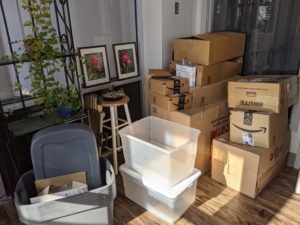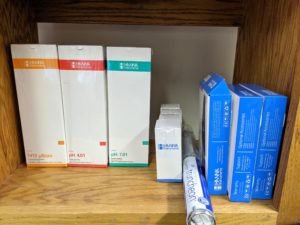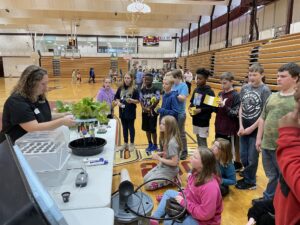Final report for YENC20-145
Project Information
Agronomic crop farmers in southeast Missouri want to diversify their crops due to shrinking margins and instability with prices. Hydroponic crops are a sustainable alternative because they have year–round production, use less resources, have higher yields per area, have lower environmental risks, are well suited for urban agriculture, and are profitable. This project aims to educate the next generation of farmers that will cover the knowledge gaps and incentivize the creation of the infrastructure required to support this emerging new sector. We will use a hands–on approach to teach students about sustainable hydroponic farming as a viable career path.
- Increase high school student’s knowledge and interest in sustainable hydroponic crop production through hands-on lectures with a commercial farmer, extension specialists, and nutrition program associates.
- Show students the potential of sustainable hydroponic farming as a viable career path.
- Develop student’s skill through hands-on experience with different hydroponic systems.
- Incentivize healthy eating habits by showing students how to cook, process, and consume hydroponic crops.
Cooperators
- (Educator)
Educational & Outreach Activities
Participation Summary:
During the pandemic, there were restrictions on entrance to the schools that delayed us in completing this project in a timely manner. As time passed, schools started allowing entrance. Three schools: Poplar Bluff High School in Poplar Bluff, MO, Mark Twain Alternative High School in Poplar Bluff, MO and Twin Rivers High school in Broseley, MO agreed to let us come in Spring 2022 one day a week to present the classes on hydroponics (Original plans had us using the high school in Neelyville, MO but they did not return multiple phone calls. Mark Twain Alternative School asked to participate.)
Initially, each class was planned with 90 minutes to fill, however, because schools were behind due to COVID, teachers felt they could only give 30 minutes of lecture followed by 20 minutes hands-on activities (totaling 50 minutes of class time which equaled a normal classroom period time).
All the materials needed for the assembly and management of hydroponic kits were purchased. Nutrient Film Technique (NFT), Dutch Buckets and Aeroponic units were prepared and partially assembled. (Original plans had a deep-water culture system. Due to the container flaw, we had to switch to an aeroponics system in order to use the available supplies and parts.
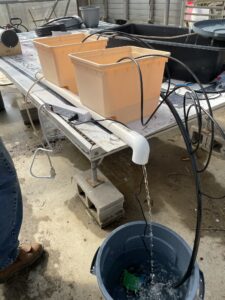
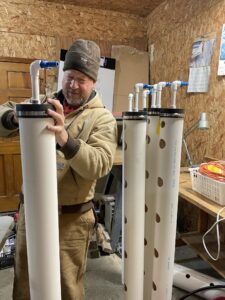
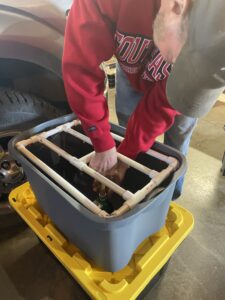
Video presentations (PowerPoint presentations recorded by zoom) were used in some classes and face-to-face lectures were used in others. Each ag teacher received a USB flash drive containing videos, PowerPoint presentation and handouts as well as the hydroponic units: Dutch bucket, NFT, and aeroponic hydroponic system for demonstration in the classroom.
Classes offered:
- Introduction to sustainable hydroponic crop production. Face-to-face presentation with PowerPoint by Donna Aufdenberg, Field Specialist in Horticulture. Video can be found at https://youtu.be/mGbyPkDQ0kQ
- Managing hydroponic crops (production, environment and nutrient solutions. Video presentation by Juan Cabrera, State Vegetable Specialist. Videos can be found at https://youtu.be/viJUV67pWWk and https://youtu.be/wKUzQK-oldQ
- Monitoring and managing diseases, pests, and environmental stress. Video presentation by Juan Cabrera, State Vegetable Specialist. Video can be found at https://youtu.be/S2T4Yirv2uM
- Harvest: now what? (post-harvest handling and food safety, health benefits of crops, and how to consume crops). Face-to-Face presentation with PowerPoint and hands-on demonstration by Emily LeMaster, Nutritional Program Assistant.
- Career opportunities: beginning a business, working for a commercial greenhouse, or where to study to develop skills. Face-to-face presentation with PowerPoint by Brad Coleman, 4-H Specialist.
- Famer engagement: we had commitment from a farmer to talk about how he decided to develop his hydroponic farm. However, it was difficult to schedule a time to visit with the farmer. As an alternative, Donna Aufdenberg completed a video interview with a hydroponic farmer to be used in the classroom. It was a challenge finding a grower who was growing non-hemp plants. Aaron Varwig of Heem Produce in Hillsboro, MO focused on his career as a young graduate and operating a greenhouse with the floating raft system growing lettuce and the Dutch bucket system growing tomatoes. He talked about his career choices and opportunities for high school graduates. Video can be found at https://youtu.be/Z0jr4WmCJ_8
The high school teachers requested advanced training, which was not originally planned. We planned and delivered a one-day intensive training for the high school teachers that included the following classes:
- Intro to hydroponics – what is hydroponics, History, Types of hydroponics, pH and EC, fertility
- Hydroponic equipment and resources – Examples
- The hydroponic environment – Lights, Temperature, Fertility, and Air
- Nutrient Solutions
- pH and EC
- Crops and scheduling
- Common problems in hydroponic
Video recordings for classes:
- Zoom recordings of the PowerPoint presentations were made: (1) Introduction to sustainable hydroponic crop production, (2) Managing hydroponic crop solutions, and (3) Monitoring and managing diseases, pests, and environmental stress.
- Juan Cabrera took different position with the University of Missouri so he was not able to complete videos on Setting up an NFT hydroponic system, setting up a DWC hydroponic system, and setting up a Dutch bucket system.
- Donna Aufdenberg completed a video interview with a hydroponic farmer to be used in the classroom. It was a challenge finding a grower who was growing non-hemp plants. Aaron Varwig of Heem Produce in Hillsboro, MO focused on his career as a young graduate and operating a greenhouse with the floating raft system growing lettuce and the Dutch bucket system growing tomatoes. He talked about his career choices and opportunities for high school graduates.
Three Butler County High Schools allowed us classroom time to present hydroponics in Agriculture Classes.
- Poplar Bluff High School in Poplar Bluff, MO limited us to three class sessions which covered the basics of hydroponics.
- Twin Rivers School in Broseley, MO granted us all five class sessions.
- Mark Twain Alternative school in Poplar Bluff, MO granted us all five class sessions.
Each teacher received a USB flash drive containing videos, PowerPoint presentation and handouts. The received hydroponic units: Dutch bucket, NFT, and aeroponic hydroponic system for demonstration in the classroom. They also received technical support for the units.
Students were given pre- and post-tests to gauge knowledge gains. Students were also asked to complete a survey to evaluate the quality of the presentations and observe the impact of the program.
During this project, students:
- Assembled hydroponic units with the assistance of Donna Aufdenberg and demonstrations: Aeroponics, Nutrient Flow Techniques (NFT,) and Dutch Buckets systems.
- Learned about to mix nutrient solutions to grow various crops.
- Learned about pH and EC (electrical conductivity) and how to measure each variable with meters.
- Learn how to care for ph and EC meters and how to calibrate them.
Learned to grow hydroponic plants from seed to harvest: lettuce, basil, tomatoes, arugula, and kale.
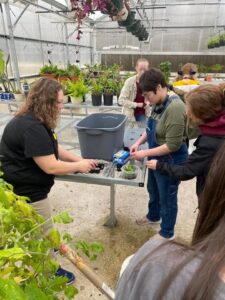
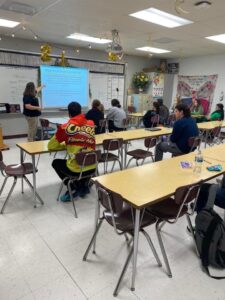
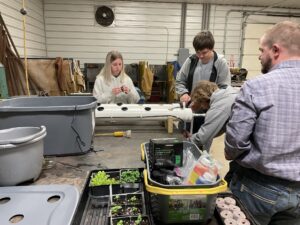
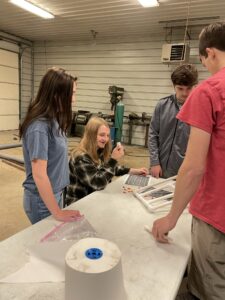
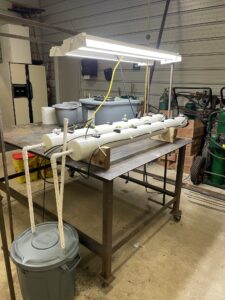
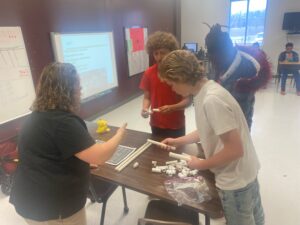
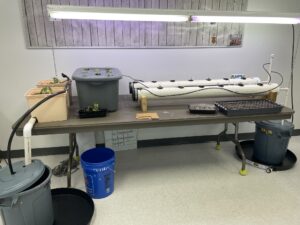
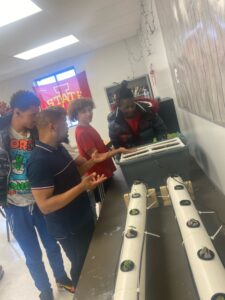
Other programming tied to this project
Ecosystem Science Day
The hydroponic systems were set up and demonstrated for an Ecosystem Science Day on December 10, 2021 at Poplar Bluff Middle School for 317 youth. Ten-minute presentations were made 15 times to reach all the youth. Donna Aufdenberg demonstrated a hydroponic raft system, NFT system, Dutch Buck System and an Aeroponic system. Youth were sent home instructions for making a mini hydroponic unit out of a plastic storage container, cotton ball, straw and fertilizer water.
Hydroponic Workshop for Educators in Poplar Bluff, MO.
Since there was an overwhelming response from teachers to be trained in hydroponics, we offered a day-long hydroponic workshop. The morning session introduced the units on display, nutrient solutions, and starting plants for the units. The afternoon session taught about more advanced topics such as pH and EC, plant management, and problems that can arise. Participants took home a simple floating raft system.
Topics include:
- Intro to hydroponics – what is hydroponics, History, Types of hydroponics, pH and EC, fertility
- Hydroponic equipment and resources – Examples
- The hydroponic environment – Lights, Temperature, Fertility, and Air
- Nutrient Solutions
- pH and EC
- Crops and scheduling
- Common problems in hydroponic
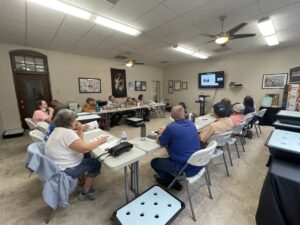
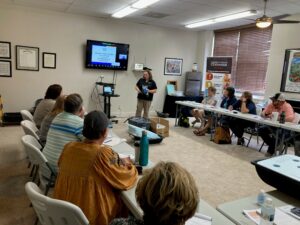
Items Created
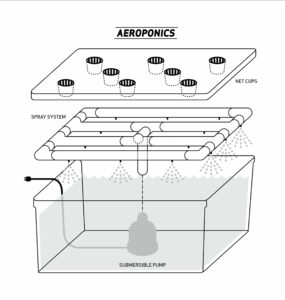
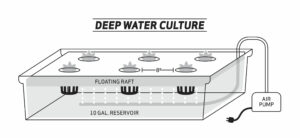
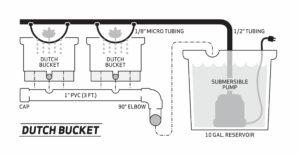
Learning Outcomes
Knowledge of crops that can be grown hydroponically
Defining sustainability in hydroponics
Defining hydroponics
Knowledge of how to growing leafy greens, herbs, and tomatoes hydroponically
Knowledge of nutrient management in hydroponics
Knowledge of problems - diseases and insects in hydroponics
Preparing, Cooking and Consuming crops (knowledge of the nutritional aspect)
- 100% (54) of surveyed students indicated knowledge gained in how to grow plants hydroponically.
- 100% (54) of surveyed students indicated knowledge gained in preparing, cooking and consuming crops grown in the hydroponic unit.
- 85% (46) of students can define hydroponics as growing plants in a water or nutrient solution.
- 66% (36) of students can give at least one part of the definition of sustainable agriculture.
- 77% (42) of students can give at least two advantages and two disadvantages of growing plants hydroponically.
- 100% (54) can identify 3 crops grown hydroponically.
Challenges:
- Reluctance of schools and teachers to give adequate time in the classroom. Information and demonstrations were always rushed. We needed more time to finish instruction.
- Lack of resources for the teachers and schools: lights, buckets, electrical outlets, space, funding to purchase future supplies, etc.
- Difficulties of students understanding pH and EC. It is a hard concept with most individuals.
- Lack of understanding simple agriculture/horticultural terms (Mark Twain Alternative School).
- Informal classroom setting at Mark Twin Alternative School. Students were allowed choice of participation and roaming of the classroom.
- No greenhouse or real suitable area for units in two of the schools. Settings were made to suit (minimally).
- Best to move hydroponic classes to mid- or late-term so key concepts can be taught at the beginning of the school term.
Other notes:
- In some classes, even 50 minutes pushed the attention span of the students. There is a need to keep students active and participating.
- Hands-on learning is best when it comes to hydroponic instruction.
- Basic knowledge of plants, plant anatomy, production and nutrition would be a benefit.
- Have a better plan for evaluation to keep attention and have answers that are understandable and usable.
- It is wise to be specific on the requirements to do this project” lights, water source, mixing tools (buckets and spoons), time and supplies.
Project Outcomes
Yes, we have written a specialty crop block grant proposal which was funded by the Missouri Department of Agriculture to place Hydroponic Units with the MU Extension Horticulture Specialists across the state who would teach sustainable agriculture in hydroponic growing.
- Students in all three high schools were able to grow greens, herbs and tomatoes with success. The greens and herbs were used in a session to feed the students. They were able to harvest, prepare and eat the produce grown. Unfortunately, there was not enough time for the students to grow and use any tomatoes for the class. Collectively, students harvested 23 heads of lettuce, harvested 28 stems of Basil, and 34 leaves of Kale. Collectively, students grew 6 tomato plants in Dutch buckets and harvested a total of 12 tomatoes before school let out for the summer.
- All three teachers plan to continue to use hydroponic units and teach hydroponics in the future. They felt comfortable in showing the presentations in class, overseeing the units and aiding the student in the growing of plants. Donna Aufdenberg and Juan Cabrera will still be available for technical advice, troubleshooting, and guest speaking.
- The project sparked interest among other extension field specialists. This led to the development of the Specialty Crop Block Grant with the aim of training Extension Field Specialist in hydroponics and equip them with demonstration units and materials needed to facilitate the delivery of educational programs in their region. We were awarded $50,000 and we began activities in November 2022.
- Four students considering career in horticulture and possibly hydroponics (per evaluations). I found out later that two students majored in an agricultural field and one student went to work in the horticulture field.
- Ten students were planning to try hydroponics at home. Two of those students successfully started hydroponic systems.
- During the school semester in which these classes were taught. Six students took exceptional interest in the hydroponic units in the classroom (per the teachers) and indicated an increased interest in greenhouse production with hydroponics.
Teaching hydroponics in schools is important since it can demonstrate to students a more sustainable and higher yielding way to grow horticulture crops than traditional methods. With many growers looking at water shortages and limited land availability, the need to grow hydroponically will only keep growing. Already vertical farming is gaining ground in urban areas.
With the schools coming out of the COVID shutdown, it was hard for schools to give the time we needed to make an true impact and collect good longer term evaluation data. The three schools were just very reluctant to fully participate. We were very thankful they gave us the time they did. In the classes, students were receptive and appreciative of the hands-on aspect of the classes: hydroponic unit construction, nutrient and pH management, germinating seeds, growing the plants and harvesting. We had good attention and feedback from most of the students.
There was a lack of resources for the teachers and schools. We had to be creative on lighting, electrical resources, buckets, water sources, and additional funds to help the schools meet the minimum demands for schools participation. In the future, we need to make sure the schools understand their obligation to provide some of these supplies or we need to find additional funding for the project.
We felt we went into the schools too soon in the semester on two of the schools as the students had yet to cover some of the topics needed in general horticulture to fully understand some of the concepts we presented. In the alternative school, the students did not even have the basic knowledge of plant science (we had to review topics such as germination, photosynthesis, plant growth, etc.). In the future, we need to make sure the students have some of the basic plant growing concepts before attempting more technical topics.
The three teachers have spoken highly of this project to other teachers in Southeast Missouri. I presently have requests from 3 teachers in neighboring counties requesting the same program. If time allows, I am hoping to the replicate this project in other counties in my region.
Information Products
- Introduction to Sustainable Hydroponics (Conference/Presentation Material)
- Nutrient solutions for Hydroponics (Conference/Presentation Material)
- Hydroponic Production Steps (Conference/Presentation Material)
- Hydroponic Problems (Conference/Presentation Material)
- Hydroponics for Beginners - Leafy Greens and Herbs (Manual/Guide)
- Hydroponics for Beginners - Tomatoes (Manual/Guide)
- Hydroponic Resources for Educators (Manual/Guide)
- Careers in Hydroponics (Conference/Presentation Material)

